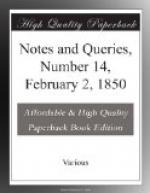O.
Burning the Dead.—Can any of your readers, who may have attended particularly to the funeral customs of different peoples, inform me whether the practice of burning the dead has ever been in vogue amongst any people excepting inhabitants of Europe and Asia? I incline to the opinion that this practice has been limited to people of Indo-Germanic or Japetic race, and I shall be obliged by any references in favour of or opposed to this view.
T.
Meaning of “Shipster."—Can any of your correspondents inform me what is the business or calling or profession of a Shipster? The term occurs in a grant of an annuity of Oct. 19. 2 Henry VIII., 1510, and made between “H.U., Gentilman, and Marie Fraunceys de Suthwerk, in com Surr Shipster.”
JOHN R. FOX.
55. Welbeck Street, Jan. 22. 1850.
Why did Dr. Dee quit Manchester?—In the Penny Cyclopaedia, art. DEE, JOHN, I find the following statement:—
“In 1595 the queen appointed Dee warden of Manchester College, he being then sixty-eight years of age. He resided there nine years; but from some cause not exactly known, he left it in 1604, and returned to his house at Mortlake, where he spent the remainder of his days.”
Can any of your correspondents assign the probable causes which led to Dr. Dee’s resignation?
T.T.W.
Burnley, Lancashire, Jan. 21. 1850. {217}
Meaning of “Emerod,” “Caredon."—In the Lansd. MS., British Museum, No. 70., there is a letter from Mr. Richard Champernowne to Sir Robert Cecil, dated in 1592, referring to the discovery of some articles pillaged from the Spanish carrack, which had then recently been captured and taken into Dartmouth harbour. Amongst these articles is one thus described:—“An Emerod, made in the form of a cross, three inches in length at the least, and of great breadth.”




